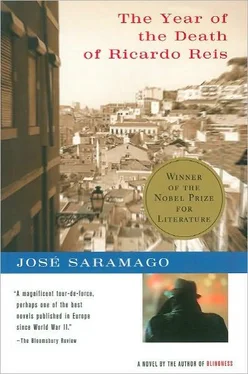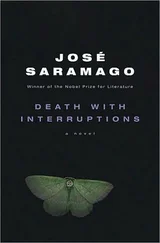José Saramago - Year of the Death of Ricardo Reis
Здесь есть возможность читать онлайн «José Saramago - Year of the Death of Ricardo Reis» весь текст электронной книги совершенно бесплатно (целиком полную версию без сокращений). В некоторых случаях можно слушать аудио, скачать через торрент в формате fb2 и присутствует краткое содержание. Год выпуска: 1992, ISBN: 1992, Издательство: Houghton Mifflin Harcourt, Жанр: Современная проза, на английском языке. Описание произведения, (предисловие) а так же отзывы посетителей доступны на портале библиотеки ЛибКат.
- Название:Year of the Death of Ricardo Reis
- Автор:
- Издательство:Houghton Mifflin Harcourt
- Жанр:
- Год:1992
- ISBN:9780547546926
- Рейтинг книги:4 / 5. Голосов: 1
-
Избранное:Добавить в избранное
- Отзывы:
-
Ваша оценка:
- 80
- 1
- 2
- 3
- 4
- 5
Year of the Death of Ricardo Reis: краткое содержание, описание и аннотация
Предлагаем к чтению аннотацию, описание, краткое содержание или предисловие (зависит от того, что написал сам автор книги «Year of the Death of Ricardo Reis»). Если вы не нашли необходимую информацию о книге — напишите в комментариях, мы постараемся отыскать её.
Year of the Death of Ricardo Reis — читать онлайн бесплатно полную книгу (весь текст) целиком
Ниже представлен текст книги, разбитый по страницам. Система сохранения места последней прочитанной страницы, позволяет с удобством читать онлайн бесплатно книгу «Year of the Death of Ricardo Reis», без необходимости каждый раз заново искать на чём Вы остановились. Поставьте закладку, и сможете в любой момент перейти на страницу, на которой закончили чтение.
Интервал:
Закладка:
Ricardo Reis crossed the Bairro Alto, descending by the Rua do Norte, and when he reached the Rua de Camoes he felt as if he were trapped in a labyrinth that always led him back to the same spot, to this bronze statue ennobled and armed with a sword, another D'Artagnan. Decorated with a crown of laurels for having rescued the queen's diamonds at the eleventh hour from the machinations of the cardinal, whom, however, with a change of times and politics he will end up serving, this musketeer standing here, who is dead and cannot reenlist, ought to be told that he is used, in turn or at random, by heads of state and even by cardinals, when it serves their interests. The hours have passed quickly during these explorations on foot, and it is time for lunch. This man appears to have nothing else to do, he sleeps, eats, strolls, and composes poetry line by line with much effort, agonizing over rhyme and meter. It is nothing compared to the endless dueling of the musketeer D'Artagnan, and the Lusiads run to more than eight thousand lines, yet Ricardo Reis too is a poet, not that he boasts of that on the hotel register, but one day people will remember him not as a doctor, just as they do not think of Alvaro de Campos as a naval engineer, or of Fernando Pessoa as a foreign correspondent. Our profession may earn us our living but not fame, which is more likely to come from having once written Nel mezzo del cammin di nostra vita or Menina e moga me levaram da casa de metis pais or En un lugar de la Mancha, of which I do not wish to remember the name, so as not to fall once again into the temptation of saying, however appropriately, As armas e os barões assinalados, may we be forgiven these borrowings, Arma virumque cano. Man must always make an effort, so that he may deserve to be called man, but he is much less master of his own person and destiny than he imagines. Time, not his time, will make him prosper or decline, sometimes for different merits, or because they are judged differently. What will you be when you discover it is night and you find yourself at the end of the road.
It was almost nightfall before the Rúa do'Sáculo was clear of paupers. Ricardo Reis had lunched in the meantime, browsed in two bookshops, lingered at the door of the Tivoli debating whether or not he wanted to see the film I Lave All Women starring Jan Kiepura. In the end, he decided to see the film some other time and return to the hotel by taxi, because his legs were giving him trouble after all that walking. When it started raining, he retreated to a nearby café, read the evening newspapers, agreed to have his shoes shined, clearly a waste of polish on streets like these, where a shower can cause a flood without any warning, but the bootblack insisted that an ounce of prevention was better than a pound of cure, A shoe when it's polished keeps out the rain, sir, and the man was right, because when Ricardo Reis removed his shoes once back in his room, his feet were warm and dry. Just what one needs to keep healthy, warm feet and a cool head. Universities may not recognize this wisdom based on experience, but one has nothing to lose by observing the precept. The hotel is so peaceful, no banging doors, no sounds of voices, the buzzer silent. Salvador is not at the reception desk, most unusual, and Pimenta, who went to look for the key, moves as swiftly and ethereally as a sprite. Obviously he has not had to carry any luggage since early that morning, lucky for him. When Ricardo Reis went down to dinner, it was almost nine o'clock, the dining room, just as he had intended, was empty, the waiters chatting in a corner, but when Salvador appeared, the staff busied themselves, for that is what we must always do when our immediate superior suddenly enters. It is enough, for example, to shift our weight to the right leg if before it was resting on the left, that's all that's required, sometimes even less. Are you serving dinner, the guest asked hesitantly. But of course, that was what they were there for. Salvador told the good doctor that on New Year's Eve they generally had few customers, and the few they had generally dined out, the traditional réveillon or révelion, what was the word. Once, they used to celebrate the festivities in the hotel, but the owners found it a costly business, the practice was discontinued, such a lot of work involved, not to mention the damage caused by the boisterousness of the guests, you know how things happen, one drink follows another, people start quarreling, and then all the noise, bedlam, and the complaints of those in no mood for merrymaking, because there are always such people. We finally stopped having the révelion , but I must confess I'm sorry, it was such a jolly occasion and the hotel enjoyed the reputation of having class and moving with the times. Now, as you can see, it's completely deserted. Well, at least you can get to bed early, Ricardo Reis consoled him, but Salvador assured him that he always waited up to hear the bells ring in the New Year at midnight, a family tradition. They always ate twelve raisins, one for each chime, to bring luck during the next year, a popular custom widely observed abroad. You're talking about rich countries, but do you really believe such a custom will bring you good fortune. I do not know, but perhaps my year would have been even worse had I not eaten those raisins. It is with such arguments that the man who has no God seeks gods, while he who has abandoned his gods invents God. One day we shall rid ourselves of both God and gods.
Ricardo Reis dined with a single waiter in attendance, the maître d' decorously positioned at the end of the dining room, and Salvador installed himself behind the reception desk to while away the hours until it was time for his révelion intime. Nothing is known of Pimenta's whereabouts, and as for the chambermaids, either they have disappeared upstairs into the attics, if there are attics, where they will toast one another's health on the stroke of midnight with intoxicating homemade liquors served with biscuits, or else they have gone home, leaving an emergency staff, as in hospitals. The kitchen already looks like an abandoned fortress. But this is mere speculation, guests are generally not interested in knowing how a hotel functions behind the scenes, all they want is a comfortable room and meals at regular intervals. For dessert Ricardo Reis did not expect to be served a large slice of cake specially baked for the festivities of Epiphany or Dia de Reis. These are thoughtful little courtesies which make a friend of every customer. The waiter smiled and quipped, Dia de Reis, you pay, Doctor. Agreed, Ramón, for that was the waiter's name, I'll pay on the Dia dos Reis, but the pun was lost on Ramón. It is still not ten o'clock, time is dragging, the old year lingers on. Ricardo Reis looks at the table where two days before he watched Doctor Sampaio and his daughter Marcenda and felt himself being enshrouded by a gray cloud. If they were present now, they might converse together, the only guests on this night which marks an ending and a new beginning, what could be more appropriate. He visualizes again the girl's pitiful gesture as she took hold of her lifeless hand and placed it on the table, that tiny hand she so dearly cherished while the other, strong and healthy, helped its sister but had its own, independent existence. It could not always assist. For example, shaking the hand of others when formally introduced, Marcenda Sampaio, Ricardo Reis, the doctor's hand would grip that of the girl from Coimbra, right hand with right hand, but while his left hand, should it so desire, could hover close to witness the encounter, hers, dangling at her side, might just as well not be present. Ricardo Reis feels the tears come to his eyes. There are still some people who speak ill of doctors, convinced that because doctors are accustomed to illness and misfortune they have hearts of stone, but look at this doctor, he belies any such criticism, perhaps because he is also a poet, though somewhat skeptical in outlook, as we have seen. Ricardo Reis is engrossed in these thoughts, some of them perhaps too difficult to unravel for anyone who like ourselves is on the outside, but Ramón, who sees much, inquires, Do you wish anything else, Doctor, a tactful way of saying, though expecting the negative, that the doctor does. We are so apt at understanding that sometimes half a word suffices. Ricardo Reis rises to his feet, says Good-night to Ramón, wishes him a Happy New Year, and as he passes the reception desk slowly repeats the greeting and the wish to Salvador. The sentiment is the same, its expression more deliberate, after all Salvador is the manager. As Ricardo Reis goes slowly upstairs, he looks worn-out, like one of those caricatures or cartoons in a magazine of the period, the Old Year covered with white hair and wrinkles, his hourglass emptied, disappearing into the deep shadows of the past, while the New Year advances in a ray of light, as chubby as those infants nourished on powdered milk, reciting a nursery rhyme that invites us to the dance of the hours, I am the year nineteen thirty-six, come rejoice with me. Ricardo Reis enters his room and sits down. The bed has been prepared, fresh water stands in the carafe should he feel thirsty during the night, his slippers wait on the bedside mat. Someone is watching over me, a guardian angel, my heartfelt thanks. On the street there is the clatter of tin cans as revelers pass. Eleven o'clock has struck already, and at that moment Ricardo Reis jumps to his feet, almost in anger, What am I doing here, everyone else is out celebrating, having a good time with their families on the streets, in dance halls, theaters, cinemas, nightclubs, I should at least go to the Rossio to see the clock at Central Station, the eye of time, those Cyclopes who hurl not thunderbolts but minutes and seconds, every bit as cruel as thunderbolts and which we must all endure, until finally they shatter me along with the planks of the ship, but not like this, sitting here watching the clock, crouched in a chair. Having finished this soliloquy, he put on his raincoat and hat, grabbed his umbrella, suddenly eager, a man transformed by having made up his mind. Salvador had gone home to his family, so it was Pimenta who asked, You're going out, Doctor. Yes, I will take a little stroll, and he started downstairs. Pimenta pursued him to the landing, When you come back, Doctor, ring the bell twice, one short ring followed by a longer one, then I'll know it's you. Will you still be up. I'll turn in after midnight, but don't worry about me, sir, you come back whenever you like. Happy New Year, Pimenta. A very prosperous New Year, Doctor, the phrases one reads on greeting cards. They said nothing more, but when Ricardo Reis reached the bottom of the stairs he remembered that one normally tips the hotel staff at this time of the year, they rely on such tips. Forget it, I have been here only three days. The Italian page is asleep, his lamp extinguished.
Читать дальшеИнтервал:
Закладка:
Похожие книги на «Year of the Death of Ricardo Reis»
Представляем Вашему вниманию похожие книги на «Year of the Death of Ricardo Reis» списком для выбора. Мы отобрали схожую по названию и смыслу литературу в надежде предоставить читателям больше вариантов отыскать новые, интересные, ещё непрочитанные произведения.
Обсуждение, отзывы о книге «Year of the Death of Ricardo Reis» и просто собственные мнения читателей. Оставьте ваши комментарии, напишите, что Вы думаете о произведении, его смысле или главных героях. Укажите что конкретно понравилось, а что нет, и почему Вы так считаете.












